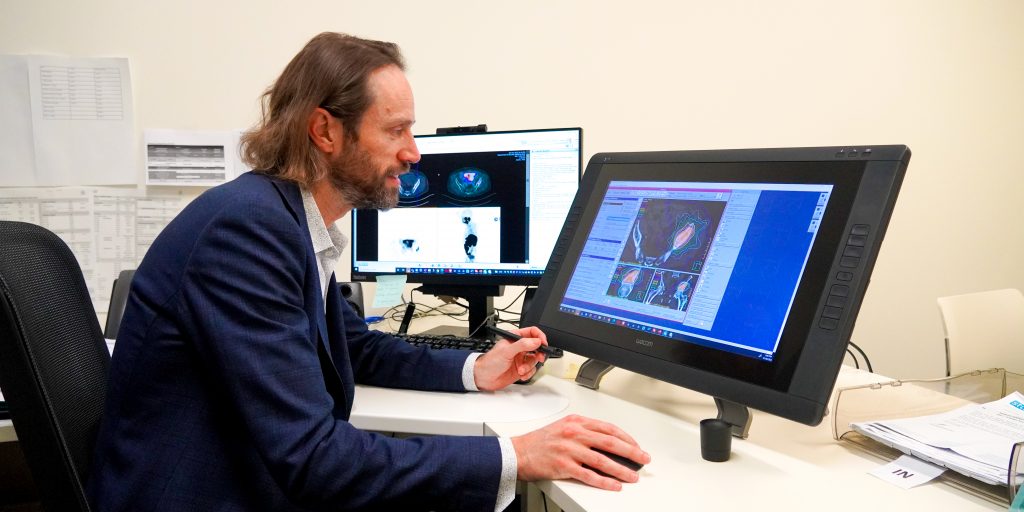Recruitment for a world-first study is underway at the Royal Adelaide Hospital, which aims to provide life-changing treatment for men with persistent prostate cancer.
The trial is testing the addition of radiation therapy to standard drug therapy as a means of controlling castrate resistant prostate cancer.
The DECREASE trial
Technological advances in prostate cancer detection methods can now reveal the spread of prostate cancer that would otherwise have been missed by conventional methods.
The DECREASE trial is seeking to determine if targeted radiation therapy, in addition to systemic second-line hormone therapy, is more effective at managing the progression of this persistent prostate cancer than hormone therapy alone.
This is the first study to test the combination of the two treatments against castrate resistant prostate cancer and follows on from positive trials treating lung cancer patients with systemic therapy in combination with local radiotherapy to metastatic sites.
If successful, this trial could provide a vital pathway to manage prostate cancer and delay the need to move to other treatment options such as chemotherapy.
“It would certainly change practice for men in this setting if we see evidence of significant improvements in disease control,” said Dr Braden Higgs, Radiation Oncologist and Principal Investigator at the Royal Adelaide Hospital.
Detecting the previously undetectable
Prostate cancer is usually managed initially by supressing the androgenic hormone testosterone with a treatment known as Androgen Deprivation Therapy (ADT).
While this can be effective initially, over time prostate cancer can become resistant to the systemic hormone treatment and can continue grow despite low levels of testosterone. This is known as castrate resistant prostate cancer.
Second generation androgen blockers, such as Darolutamide, have been proven to provide better control of castrate resistant prostate cancer which still appears to be localised using conventional tests such as computed tomography (CT) and bone scans.
Newer generation PSMA-PET scans can now detect low amounts of cancer that has spread beyond the prostate and would be missed by conventional testing.
The PSMA-PET scans use radioactive dye to light up specific areas of the body containing the Prostate Specific Membrane Antigen protein, a protein found on the surface of prostate cancer cells.
The key question the trial study wants to answer is whether adding targeted radiation therapy to the usual treatment of second-line hormone therapy can better manage this newly detectable metastatic cancer.
“The hope is that it might improve the duration of cancer control and hence quality of life for men with metastatic castrate resistant prostate cancer by delaying their need to move onto other treatment options such as chemotherapy, which can have significant side effects,” said Dr Higgs.
What’s happening
The trial has recently opened at the RAH and is likely to be active for the next two years. The multicentre trial is sponsored by TROG Cancer Research and it’s lead investigators are based at the Peter MacCallum Cancer Centre in Melbourne, with a further 13 sites around Australia now participating.
All of the participants will receive the standard Darolutamide hormone treatment, while half will also be treated with consolidation radiotherapy after 12 weeks.
“If this is a positive trial, it has the potential that radiotherapy may become part of the standard care, along with systemic therapy.”
One of the unique parts about this trial is the collaboration with medical oncologists. Dr Hsiang Tan is a Medical Oncologist and Co-Investigator of the DECREASE trial at RAH.
“It’s a good example of cross-collaboration between the two oncology specialties, and it is great to be involved with colleagues like Dr Tan at the research level given how regularly we collaborate at the clinical level.” said Dr Higgs.



